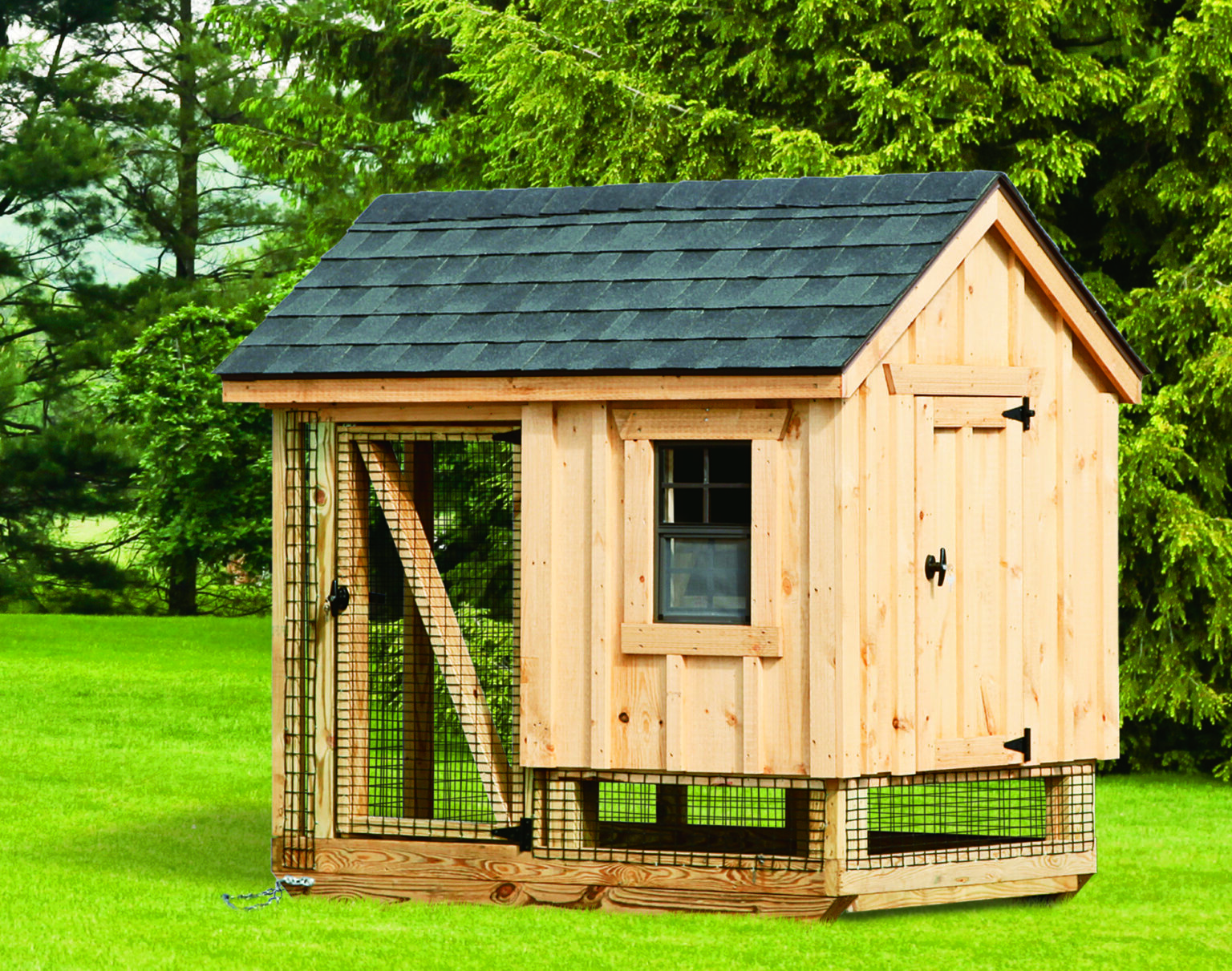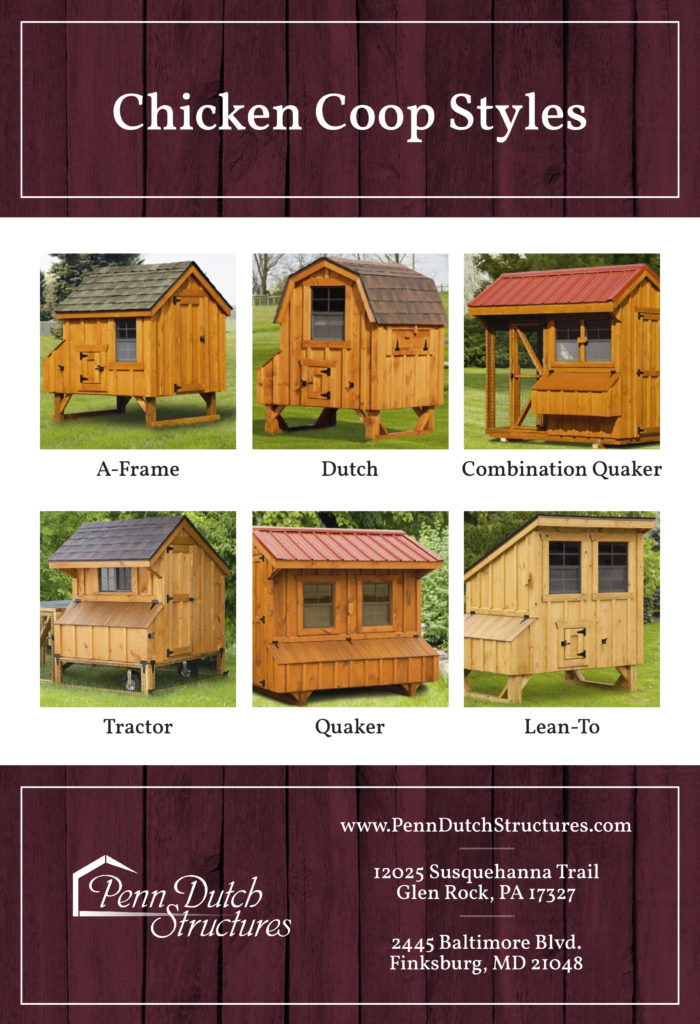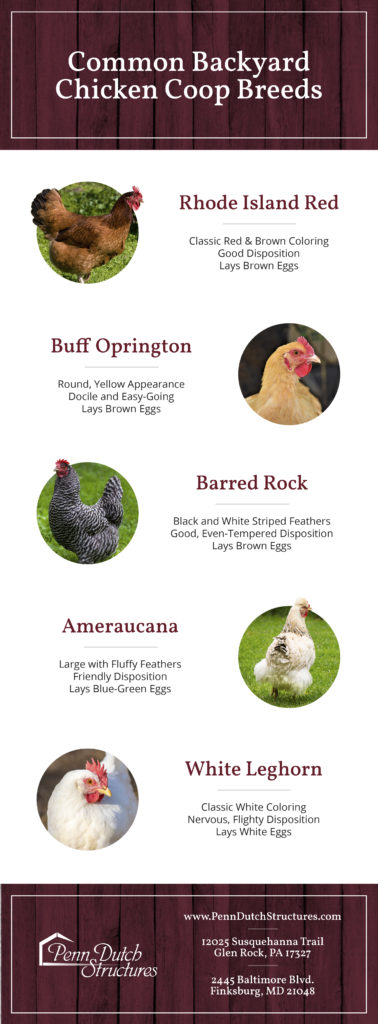
Backyard Chickens: A Growing Trend
Raising your own backyard chickens is a popular trend that only continues to grow year after year. Most chicken owners utilize their backyard flock for home use to collect their eggs for consumption. Hens have the potential to lay a single egg per day. Multiply this by the 12 hens in your backyard, and you could have a fresh dozen eggs every morning.
And, although you may be skeptical, chickens make great pets. Chickens are social animals who enjoy being picked up, pet, cuddled, and hugged. But there is a lot more that goes into raising chickens besides loving them and enjoying eggs.
Buying a Chicken Coop For Your Backyard
At the bare minimum, the coop you choose should be easy to clean, well ventilated, but draft-free, include clean watering and feeding stations and offer adequate roosts. Natural light is a plus with chicken coop sheds. Dirt floors can work if the soil is sandy and there is reasonable drainage. However, a wooden floor is vastly easier to clean and protect. We recommend our epoxy surface for ease of cleaning. Good bedding, such as sawdust (untreated wood only), wood shavings, or chopped straw is most ideal.
Size
Most coop guides suggest approximately 2 square feet of space per adult bird. Keeping the coop filled with the right amount of chickens helps keep the temperature at a comfortable setting for your pets.
Style
All of the following styles of chicken coops come with standard features: nesting boxes, roost, 5/8 LP flooring with a 10-year warranty, and Tech Shield Roofing which helps keep the coop at a comfortable temperature.

- A-Frame: The A-Frame is a classic style and a fan favorite. It has simple, straight lines, and beautiful trim.
- Dutch: The Dutch hen house has a quaint, hip style roof, which makes it look like a miniature barn. The roof also optimizes useable interior space.
- Combination: The Combination series boasts a henhouse with an attached chicken run to allow the chickens a safe place to scratch.
- Tractor: The tractor style is a moveable cage and run combo. This allows you to keep the chickens on fresh grass by easily moving it to different areas of your property.
- Quaker: Quaker coops have a distinctive roofline overhang that is inspired by century-old barn styles. This style maximizes head space in the interior.
- Lean-To: The Lean-To is designed to save space by allowing you to place it up against a building or wall.
What Else to Know Before Buying a Chicken Coop
Easily clean your chicken coop by adding a removable litter tray or installing an Epoxy floor.
Adding an electrical package allows for added conveniences such as a heated water bowl. This relieves you from the task of constantly changing water in the freezing, winter months. An automatic door is also helpful since it provides extra safety. Nothing is quite as devastating as forgetting to close the door come nighttime and having a predator ruin your flock.
Being able to easily move the chicken coop shed keeps your grass healthier and provides your chickens with fresh scratching areas. The wheel system is easy to use and allows you to quickly crank the wheels up and down. Wheels also give you the ability to fertilize your entire yard without sacrificing your grass.
Breeds of Chickens to Consider
Picking out your breed, or breeds, of chickens is an important decision. Here are some ideas to consider when making the choice:
- Think about the average climate where you live. Do you experience extreme temperatures? Your chickens will need to be able to handle the weather.
- Decide what type of eggs you prefer: White? Brown? Blue?
- Look into the disposition of the bird. Will you be treating them as pets? Will your children be around them?
- Another factor is their appearance. Do you want small or large chickens? Do you want a rare or unusual look to them? Or, do you prefer a classic looking chicken?
- Consider where you live and the space that you have available. Are you in an urban, suburban, or rural setting?
At the end of the day, it usually comes down to personal preference. You should enjoy the breed that you’re raising. Create a list of your wants when it comes to raising backyard chickens.

Common Chicken Problems and Predators
Of course, by adding chickens to your backyard, you also add a few risks as well. The problems could lie with the chickens themselves, although many of these problems are preventable or easily treatable. Something else to look out for is the predators that the chickens may inevitably attract.
Problems
Stubborn Hens- Occasionally, you’ll experience broody hens who refuse to leave the nest. To avoid this, try to break the habit by removing the eggs as soon as they are laid. Then, keep the hens away from the nesting boxes for a week. Nesting inserts can also be used which causes the eggs to roll away immediately after being laid.
Blocked/Sour Crop- Keep poultry grit available in order to help with digestion. Another option is feeding the hen some oil and massaging the throat area several times a day to help loosen the blockage. Garlic and natural yogurt can also be used to alleviate the problem.
Hen Pecking– One of the main reasons hens will peck is because of boredom. Add items for distraction such as a head of cabbage, greens, or acquiring a Peck-a-Block for the run. Space overcrowding is another reason for pecking. Make sure to stay at the recommended number for the size of chicken coop shed you have.
If pecking gets to the point where blood is being drawn, the injured hen must be removed since blood only encourages the behavior. Anti-peck products can be applied to the injured hen in order to stop the problem.
Feeding problems– Believe it or not, there’s an incorrect way to feed your chickens. Table scraps or an all-grass diet does not provide the necessary nutrition for chickens, which impacts their egg-laying. Make sure that wild birds don’t have access to the water and feed as it could expose your chickens to diseases.
Chickens need twice as much water as they do feed. An automatic waterer is recommended, but if you do not use one, make sure to change the water daily, and always ensure that there is plenty of freshwater available. Not enough water will cause health problems as they need water to digest their food.
Chickens need extra grain in colder months to keep them warm and also to compensate for the lack of grass and insects. Make sure the birds have plenty of fresh, clean water — not ice!
Predators
Raccoons prey on chickens at night and occasionally during the day. Their small hands can reach through the wire and remove limbs. Easy latches can also be unlocked by raccoons.
Dogs are natural predators and will find chickens hard to resist, even if they are well trained and well behaved. Even your own family pet can be tempted by your backyard chickens. Some dogs will chase/play with the chickens, but this has the possibility of traumatizing the hens which could keep them from laying eggs for months. However, dogs can be trained to guard the chickens or to leave them alone completely.
Snakes have the ability to kill full-size hens if they are venomous, but are more likely to go for the eggs. Keep the chicken coop shed away from compost piles, wood piles, or rock piles since these are snakes’ favorite hiding spots. Be sure to keep the henhouse secure with no cracks or holes, and keep tall grass cut.
Other predators to be aware of:
- Skunks
- Hawks
- Opossum
- Bobcat, Coyote, or Fox
Are you ready to get started with backyard chickens? Browse the many chicken coop sheds we have to offer!
